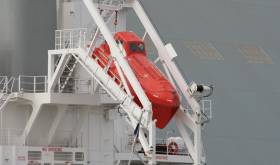Displaying items by tag: Sea Survival
Sea Survival Training Ahead of 2024 Offshore Sailing Season
Are you ready for the Round Ireland Race? Kenny Rumball of the INSS is looking forward to a series of Sea Survival Courses.
Rumball, the RORC Seamanship Trophy recipient, includes plenty of first-hand experience in the course, including dealing with a MOB in the 2018 Round Ireland Race (video of the presentation below). “This course is based on practical experiences. We use these real-world experiences to bring each theoretical component into focus”.
Liferaft and Pool Practical
Have you ever tried boarding a liferaft?! Hopefully not! But participants do exactly this dressed in oilskins and lifejackets (provided by INSS). “The common refrain afterwards is - I didn’t realise how difficult it would be! However, graduates all feel real confidence they now knowvthe correct techniques to survive” comments Rumball.
 The INSS are happy to schedule courses for crews anywhere in Ireland
The INSS are happy to schedule courses for crews anywhere in Ireland
Surviving in the water
There’s also lots of training on what to do if you end up in the water alone or with others but without a liferaft.
Course tutor Kenny Rumball and fellow crew member John White recount a tale from the 2018 Round Ireland Race, where John fell from J109 Jedi at 1 am while off the coast of Kerry and was facing 30 knots and 3-4 metre seas.
Courses
The Irish National Sailing & Powerboat School run the World Sailing programme.
 Instructor Kenny Rumball of the INSS is looking forward to a series of Sea Survival Courses
Instructor Kenny Rumball of the INSS is looking forward to a series of Sea Survival Courses
The World Sailing Offshore Safety Course covers the requirements of World Sailing Offshore Special Regulations 6.01 for Category 0, 1 and some Category 2 offshore races.
The next INSS course is on Saturday 9th and Sunday, the 10th March, in Dun Laoghaire, with more details here
Equally, the school are happy to schedule courses for crews anywhere in Ireland, and crews are invited to get in touch directly with the school on 01 2844195 or by email to [email protected].
Pre-Christmas Sea Survival Training Announced at the INSS, Dun Laoghaire
The Irish National Sailing & Powerboat School at Dun Laoghaire have announced one final chance to get your sea survival training completed before the end of the year. Kenny Rumball will be delivering a course on Wednesday 14th and Thursday 15th of December in advance of a busy 2023 offshore racing season, including an expanded ISORA calendar and the Fastnet Race.
The course takes place at the Irish National Sailing & Powerboat School’s Dun Laoghaire West Pier clubhouse, with practical components running in the Monkstown Blue Pool. Course times are 9 am-5 pm each day, and included in the training are the components to qualify for the World Sailing Offshore Personal Safety Certificate. This would cover successful attendees for Categories 0, 1 and some Category 2 offshore races. It also meets the requirements for commercial endorsement for power and sail operators.
 Kenny Rumball of the Irish National Sailing & Powerboat School at Dun Laoghaire
Kenny Rumball of the Irish National Sailing & Powerboat School at Dun Laoghaire
Kenny Rumball shares plans for 2023, “We’re about to publish an expanded programme of shore-based training and courses suitable for commercial operators. This is to build upon the return of our full range of advanced training courses this year that had been curtailed by the pandemic. It’s great to see the increased number of those interested in entering the marine industry, and we’ll play our part in supporting this”.
The school are shortly publishing dates for a wide range of Navigation and Theory courses, intermediate powerboat, advanced powerboat and Yachtmaster programmes.
For now, those interested in getting a pre-Christmas boating safety workout can join the Sea Survival Course on Wednesday, 14th and Thursday, 15th of December here.
Sea Survival Training Course Dispute Moves To High Court
#CourseDispute - A top maritime college’s dispute with Irish marine authorities over the approval of sea survival refresher training has reached the High Court, as the Irish Examiner reports.
The National Maritime College of Ireland, under the Cork Institute of Technology, argues that the refusal by Transport Minister Shane Ross to approve its refresher courses could see it facing claims for almost €1 million in course fees.
As previously reported on Afloat.ie, all commercial mariners were required to have completed a programme of mandatory refresher training in basic sea survival by the start of this year.
But the NMCI claimed a submission it made in early 2015 for its relevant courses — provided in a joint venture with SEFtec Global Training Ireland Limited at a cost of €800 per individual — was not approved by the department, putting jobs at risk.
Now that joint venture, SNO, is making a legal challenge against the Department of Transport’s refusal to recognise its certificates — noting that a recent Marine Notice regarding ‘approved’ training is “wholly irrational” and allegedly breaches EU regulations.
The Irish Examiner has much more on the story HERE.





























































